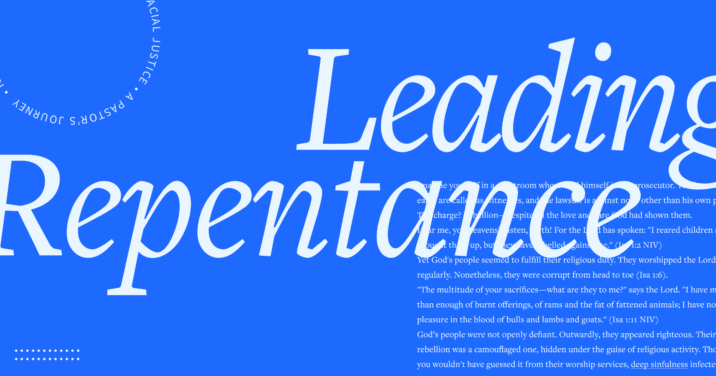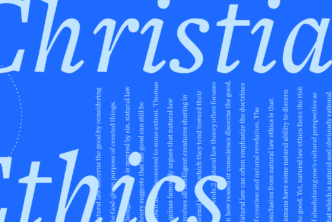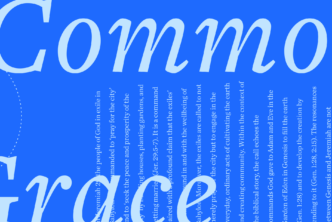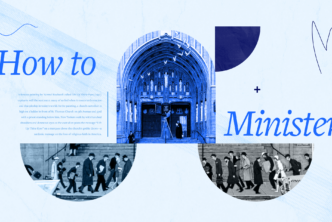Editor’s note: The articles in our political theology series are the opinions of the authors, not those of Logos. We are publishing a breadth of voices to reflect varying perspectives within the church.
Imagine yourself in a courtroom where God himself is the prosecutor. The heavens and earth are called as witnesses, and the lawsuit is against none other than his own people. The charge? Rebellion—despite all the love and care God had shown them.
Hear me, you heavens! Listen, earth!
For the Lord has spoken:
“I reared children and brought them up,
but they have rebelled against me.” (Isa 1:2 NIV)
God’s people seemed to fulfill their religious duty. They worshipped the Lord regularly. Nonetheless, they were corrupt from head to toe (Isa 1:6).
“The multitude of your sacrifices—
what are they to me?” says the Lord.
“I have more than enough of burnt offerings,
of rams and the fat of fattened animals;
I have no pleasure
in the blood of bulls and lambs and goats.” (Isa 1:11 NIV)
God’s people were not openly defiant. Outwardly, they appeared righteous. Their rebellion was a camouflaged one, hidden under the guise of religious activity. Though you wouldn’t have guessed it from their worship services, deep sinfulness infected their hearts and nation.
What does God want from us?
Instead of depending on dubious political alliances to save them (Isa 31:1) or flattering themselves with empty worship (Isa 1:10–15), God wanted them to become a people of justice.
Learn to do right; seek justice.
Defend the oppressed.
Take up the cause of the fatherless;
plead the case of the widow. (Isa 1:17 NIV)
Justice (מִשְׁפָּט, mishpat) is one of those Hebrew words that informs the deep architecture of the Old Testament. At root, it means treating all people as image bearers of God who are worthy of dignity, respect, and fair treatment. In other words, justice requires we treat all people as if they matter, because they do.
God gets painfully specific in this section. He drives this point home by telling them to defend the oppressed, take up the cause of the fatherless, and plead the case of the widow. These were the people who notoriously had the least power in the nation of Israel. In other words, if you want to determine whether or not a nation or a culture is just, don’t ask the rich and powerful. Instead, ask the poor and the oppressed. If a society treats orphans, widows, and the oppressed fairly, you can be pretty sure that it is moving towards God’s idea of justice.
The alarm goes off
They call carbon monoxide the “silent killer” because it is odorless and tasteless. Breathing it in has no immediately noticeable effect on your body. But keep breathing it in, and you will die. Claiming to follow God while failing to pursue justice is a lot like that. An outward veneer of worship and religious activity can camouflage your path of spiritual destruction.
The early chapters of Isaiah (1–5) show the absolutely lethal deception caused by religious hypocrisy. We can be involved in the most heinous of sins—particularly sins of injustice—and yet be so blind to it that we continue to worship God as if we were living in obedience to him.
This deeply entrenched hypocrisy and spiritual blindness defined Judah and Jerusalem at the time of Isaiah’s ministry. The rich and powerful trampled on the poor, yet still worshiped God regularly. This deadly cocktail of empty religious ritual, financial security, and the promise of powerful political alliances had lulled the people into a life-threatening spiritual stupor.
We can be involved in the most heinous of sins—particularly sins of injustice—and yet be so blind to it that we continue to worship God as if we were living in obedience to him.
These conditions provide the context to Isaiah’s famous throne room vision of the Holy One of Israel (Isa 6:1–13). As Isaiah encounters God’s very presence, his holiness cuts through the spiritual deception that had blinded and lulled Isaiah to sleep. “Woe to me!” he cried. “I am ruined! For I am a man of unclean lips, and I live among a people of unclean lips, and my eyes have seen the King, the Lord Almighty” (Isa 6:5 NIV).
This vision functions like a carbon monoxide alarm going off. Isaiah and the people of Israel are in grave danger. They must repent or they will be swept away.
How repentance shaped my pastoring
On June 17, 2015, a gunman brutally murdered nine people at Mother Emanuel Church in Charleston, South Carolina. Sadly, this was not the first racially motivated shooting to make major headlines. Nonetheless, it moved me as prior ones had not.
I grew up just outside of Charleston. For that reason, I think, this particular outburst of racial hatred stirred something in my heart. I felt I needed to do something—although I wasn’t sure exactly what.
My wife and I decided to worship the following Sunday at First AME Church in Seattle, less than a mile away from the church where I had pastored for over ten years at the time. I had never worshiped at that church before, so I wasn’t sure what to expect.
However, as I put on my suit that morning, it dawned on me that I had never worshiped in any Black church before. Never. Not once. The more I thought about it, the more I realized why: Black churches were invisible to me.
Exposed and undone
I was part of an urban church planting movement that took off in the 90s. People like me would come to places like San Francisco, Seattle, and Chicago and tell ourselves that we were “bringing the gospel back to the city.” At the time, I actually believed it to be true.
Meanwhile, First AME had been anchored in my neighborhood since 1886. Faithfully worshiping and serving the Lord for well over a century, they had been one of the key Black congregations leading our city through the civil rights movement.
By contrast, the church where I serve had its first worship service in 1998. To think we were “bringing the gospel back” to Seattle is laughable—and offensive. I thought this way because I didn’t see Black churches at all. They didn’t matter to me.
If God’s justice (מִשְׁפָּט) requires treating all people as if they have inherent dignity as his image bearers, then my erasure of Black churches was a direct affront to those churches—as well as their Savior. I was guilty of utter indifference to an entire group of people Jesus loves. I realized on that day that I was, indeed, guilty of racism.
My erasure of Black churches was a direct affront to those churches—as well as their Savior. I was guilty of utter indifference to entire group of people Jesus loves.
This realization shocked me. I grew up in the American South. I knew real racists—and I was proudly not one of them (or so I thought before that week). I had Black friends. I served in the military under Black leaders. I had read James Baldwin, Toni Morrison, and Richard Wright. I financially supported PBS for crying out loud! Racists lived in places like Eastern Washington and South Carolina, not in the heart of Seattle.
The tectonic plates were shifting inside of me. Up until that time, I thought I was one of the least racist people I knew. But the evidence against me was mounting. I realized things lurking inside my heart that I had been oblivious to (Ps 19:12), that the Lord was bringing into the light. Like Isaiah in his prayerful vision (Isa 6:1–5), or Paul on the Damascus road (Acts 9:1–9), I had seen something rotten and frightening about myself.
I was undone.
Discipled by grace
When my wife and I arrived at First AME, we were greeted warmly at the door, handed a worship bulletin, and found a pew in the middle of the sanctuary. It was a mostly Black congregation, but there were a handful of white people like us paying their respects that day.
At some point—and I can’t remember exactly how this happened—their senior pastor found out I was also a minister of a neighborhood congregation. During the welcome time of the service, he asked us all to stand. And then he did something totally unexpected.
He handed me a microphone.
This Black man, who had never met me, saw me—a white man. He treated me as a guest of honor and wanted me speak to his people. He, a pastor of a church I couldn’t find on a map just days before, wanted to hear my voice.
I was undone again. Though this time I was undone by the grace of God I experienced through the ministry of this man and his congregation.
The closing hymn that week was “Jesus Promised, He’ll Take Care of Me.” It is a wonderful celebration and declaration that the Lord will be true to his word and take care of us. Given the events of the week, the song took on a profound depth for me. The congregation sang it joyfully and boldly, even through their tears.
I sometimes preach about having complex emotions—like being able to experience joy in the midst of tremendous grief. But in the old wooden pews of this historic church, I was experiencing this like never before. This congregation was discipling me.
Then one of the seraphim flew to me with a live coal in his hand, which he had taken with tongs from the altar. With it he touched my mouth and said, “See, this has touched your lips; your guilt is taken away and your sin atoned for.” (Isa 6:6–7 NIV)
Like Isaiah when the hot coal from the altar of God touched his lips—the very place of his sin—I was being forgiven and healed, even though it burned deeply.
Transformed and sent
That experience forever changed me.
I began to form a friendship with the pastor of that AME church. Though we came from totally different worlds—he grew up on the tough streets of West Oakland and I grew up in an all-white suburb in South Carolina—we became colleagues and ministry partners.
This experience changed the way I read the Bible. Things that had been invisible to me now became visible.
He came and taught our people. I came back to his church and preached to them. Their church has been incredibly active in the community for over a century—seeking to meet all kinds of holistic needs for the poor and the hurting. We joined their work and eagerly volunteered. I took part in marches, went to community forums hosted by First AME, and took part in joint worship services. The world was getting bigger to me.
Then I heard the voice of the Lord saying, “Whom shall I send? And who will go for us?” And I said, “Here am I. Send me!” (Isa 6:8 NIV)
This experience changed the way I read the Bible. Things that had been invisible to me now became visible, and I was bringing them to our congregation to consider.
Scripture has a lot to say about power and its abuse. God also seems to be very interested in justice and love of neighbor. These kinds of applications come up regularly now in our preaching because the Scriptures address them regularly. In addition to Sunday sermons, we have an adult education ministry where we have been able to explore questions of racial justice more deeply.
The hard work of racial justice
He said, “Go and tell this people:
‘Be ever hearing, but never understanding;
be ever seeing, but never perceiving.’
Make the heart of this people calloused;
make their ears dull
and close their eyes.
Otherwise they might see with their eyes,
hear with their ears,
understand with their hearts,
and turn and be healed.” (Isa 6:9–10 NIV)
Isaiah was now able to see his own sin and his culture’s sins in light of the holiness and grace of God. Out of that experience, he had to speak out.
I have felt the same way.
By the grace of God, I can say that our congregation responded more positively than the people Isaiah preached to. To be sure, some folks didn’t like the direction we were heading and decided to leave the church. That said, most of our congregation resonated with this adjustment and willingly did the painful work of examining the logs in our own eyes (Matt 7:3–5).
All of this, I believe, had a strong influence on our congregation’s readiness to bring on an African American associate pastor, who served our church for five years. Though this proved challenging in many ways—particularly for him, but also for our mostly white congregation—it was a huge gift to our congregation. The work of racial justice is the hard work of mutual love.
Our church will never be the same. He led us to a posture of serving the poor and the vulnerable in our city. He was able to do this, in part, because he was theologically and experientially attuned to certain voices we were not. The church is better and stronger when we more fully reflect the image of God into the world.
More personally, I have learned—yet again—that repentance won’t kill you. Rather, it’s God’s grace to us in Christ. God undoes us in order to remake us: forgiven, healed, and more aligned to his heart for justice and love.
Recommended resources on race and justice from John Haralson
Reading While Black: African American Biblical Interpretation as an Exercise in Hope
Regular price: $12.99
Color of Compromise Video Study: The Truth about the American Church’s Complicity in Racism
Regular price: $79.99
Related articles
- Black Political Theology: An Anti-oppression Faith
- Endurance Produced by Suffering: The Black Church in America
- 6 Black Theologians from Church History You Should Know
- Black History Is Family History






